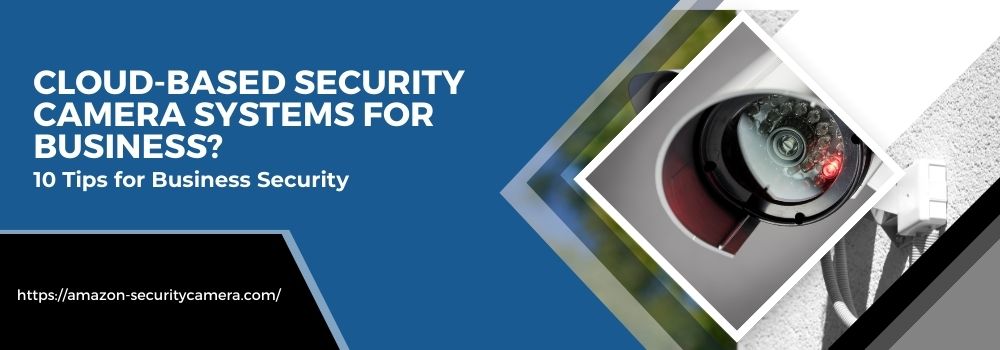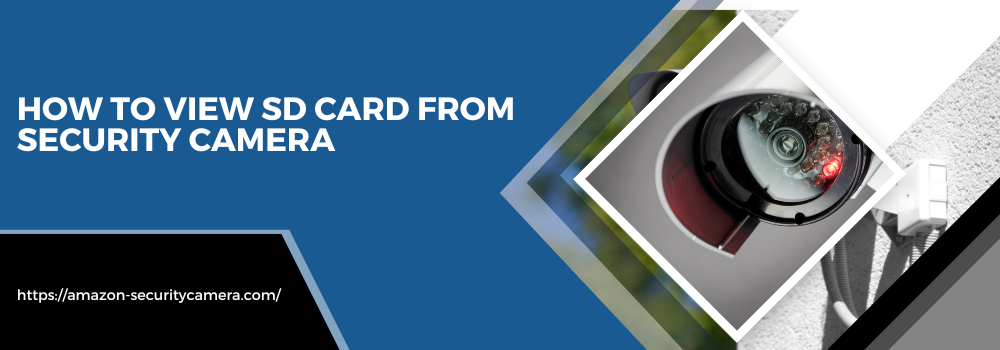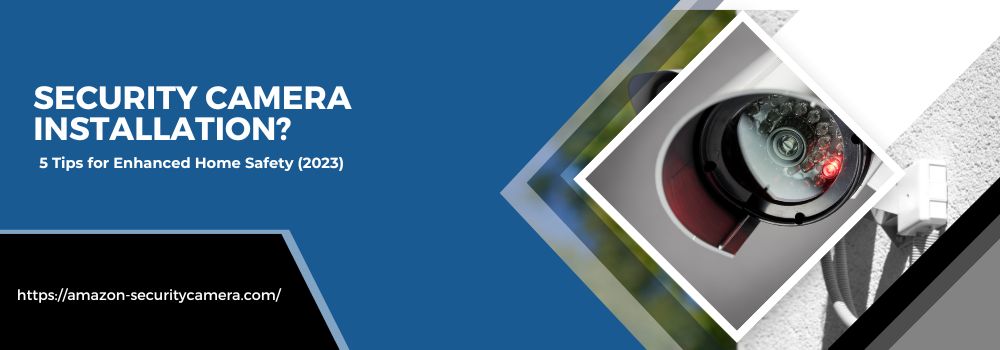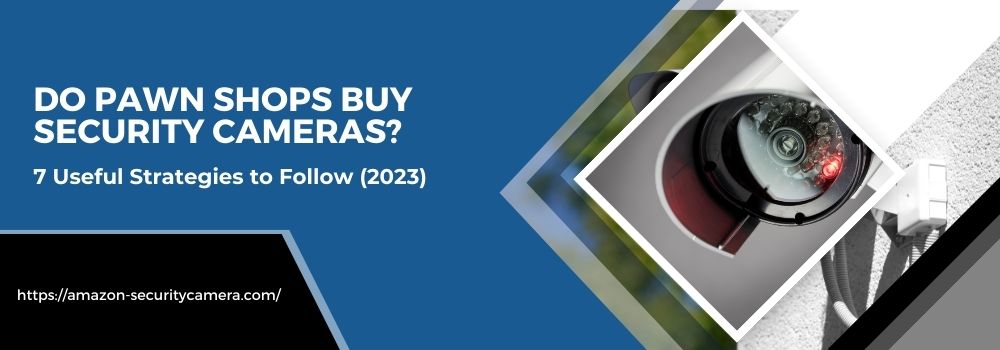Having a strong security system in place is essential for any business, regardless of size. A security camera system can help keep your premises safe and secure from potential threats, as well as improve safety and productivity within the workplace. With cloud-based systems now widely available, businesses can have access to video recordings anytime and anywhere with the right hardware.
Cloud-based security camera systems offer several advantages over traditional systems. Firstly, they provide real-time monitoring, allowing businesses to view live footage from their cameras from any location. Secondly, with data stored securely in the cloud, there’s no need for significant on-site storage equipment, reducing physical security risks. Lastly, cloud systems facilitate easy scaling as a business grows, with the ability to add or remove cameras as needed without major system overhauls.
In this blog post, we’ll take you through 10 tips on how to best leverage these technologies for optimal protection against risks while minimizing costs associated with onsite storage solutions. Keep reading to find out what works best when it comes to ensuring excellent data security and quality video surveillance that will exceed even the highest industry standards!
Table of Contents
Understand the Advantages of Cloud-Based Surveillance Systems
Cloud-based surveillance systems aren’t just the future, they’re the present. With streamlined installation, unprecedented flexibility, and unparalleled access to real-time data, these systems are revolutionizing business security. They present an opportunity to not just watch, but to truly see, making your business smarter, safer, and more secure. Let’s delve into the key advantages that make cloud-based systems a game-changing innovation.
Consider Different Levels of Security for Your Business
Not all businesses require the same level of security. Evaluate your needs based on factors such as location, business size, and nature of operations. Maybe you need a 24/7 multi-camera system for a retail store, or perhaps a few strategically placed cameras for a small office. Tailoring your security measures ensures optimal protection.
- Basic Security: This level is ideal for small businesses or startups with limited physical assets. It could include a few cameras placed at entrances and exits, combined with a simple alarm system.
- Intermediate Security: Suitable for medium-sized businesses, this level might incorporate more cameras, both indoor and outdoor, covering key areas like warehouses or storage rooms. It may also include motion detection technology and access control systems.
- Advanced Security: This level is for businesses with high security needs, such as financial institutions or data centers. It would typically feature a comprehensive network of cameras, advanced intrusion detection systems, biometric access controls, and 24/7 monitoring services.
- Hybrid Security: This level combines elements of physical and digital security, suitable for businesses that handle sensitive data. This might include cloud-based surveillance systems, cybersecurity measures, and robust physical security controls.
- Custom Security: For unique business needs, a custom security setup might be the best option. This could include specific features like thermal cameras, license plate recognition, or specialized monitoring for specific industries.
Choose the Right Cameras for Your Security System
When selecting cameras for your security system, consider the unique needs of your business. Different models offer various features like night vision, heat mapping, and motion detection. In high-risk areas, opt for cameras with higher resolution and wide-angle lenses for detailed views. For large outdoor spaces, thermal or infrared cameras can be effective. Don’t forget to consider the integration of cloud services for convenient access to real-time and recorded footage.
Establish Clear Policies for Use and Access to Camera Feeds
Implementing a security camera system should go hand in hand with clear and comprehensive policies. Employees should be informed about the usage of camera feeds, areas under surveillance, and the reasons behind the monitoring. This promotes transparency and trust within the organization. Moreover, strict access controls must be put in place to safeguard the integrity of surveillance data, allowing only authorized personnel to view or manipulate the footage. Doing so not only boosts security but also ensures compliance with privacy laws and regulations.
Invest in a Reliable Internet Network for Video Streaming
A trustworthy internet network is the linchpin of an effective cloud-based security camera system. It ensures seamless video streaming and immediate access to crucial surveillance data. Investing in a high-speed, reliable network can help mitigate disruptions, reduce buffering time, and ensure smooth, real-time viewing of your security feed. This is particularly vital for businesses where prompt response to security incidents can make all the difference. Hence, consider your network capabilities as an integral part of your security strategy.
Monitor Staff Activity with Temperature Sensors and Motion Detectors
Cloud-based security camera systems often come with additional features like temperature sensors and motion detectors. These tools provide added layers of safety and efficiency, monitoring changes in environment or sudden movements that could indicate potential risks. They can also aid in improving productivity by tracking employee movement, ensuring areas are adequately staffed at all times. This versatile functionality makes these systems a smart investment for any business.
Ensure Comprehensive Coverage with the Right Number of Cameras
The number of security cameras needed for comprehensive coverage depends on your business’s size and layout. Strategically placed cameras can monitor high-risk areas, entry and exit points, or high-value assets. A properly designed system ensures no blind spots, enhancing your security posture. Cloud-based security camera systems offer scalable solutions, allowing businesses to adjust their surveillance needs with changing circumstances. Remember, thorough coverage is not about quantity but quality and strategic placement of cameras.
Utilize Multi-Layered Authentication Methods for Remote Viewing
To ensure the integrity of your cloud-based security camera system, employ multi-layered authentication methods for remote viewing. This means enforcing stringent password policies, utilizing biometric data, and incorporating two-factor authentication. These measures not only protect your surveillance feed from unauthorized access but also reinforce your overall cybersecurity framework. With robust security protocols, you can confidently access your surveillance feed remotely, knowing your data is well-protected.
Take Advantage of Cloud Storage Features for Enhanced Protection
Cloud storage provides an added layer of protection for your surveillance data. With cloud-based security camera systems, footage is stored off-site on secured servers, safeguarding it from local threats like theft or hardware damage. The availability of unlimited storage space and automatic backups further ensures that your critical security data is always available when needed, providing peace of mind and an uninterrupted security overview.
Keep Your System Up-to-Date with Regular Software Updates
Regular software updates play a critical role in maintaining the effectiveness of your cloud-based security camera system. They often come with enhanced features, bug fixes, and most importantly, security patches to combat the latest threats. Staying updated ensures that your system remains robust and reliable, helping to sustain a high level of security within your business premises.
Conclusion
In the end, investing in a cloud-based security camera system for your business is a wise decision. It not only provides better protection against potential threats but also offers added convenience and flexibility with remote access and storage options. By taking advantage of multi-layered authentication, cloud storage features, and regular software updates, you can ensure that your surveillance data remains secure and readily available at all times.
Faqs
Q1. What is the best wireless security camera for business?
A1. The best wireless security camera for business would depend on your specific needs and budget. Some popular options include Arlo Pro 3, Nest Cam IQ Outdoor, and Ring Stick Up Cam Battery. It is essential to consider features like video quality, storage options, and remote access when choosing a wireless security camera system for your business.
Q2. Best Cloud-Based Security Cameras for Business?
Some of the best cloud-based security cameras for business include Nest Cam IQ Indoor, Reolink Argus 2, and Ring Spotlight Cam Battery. These cameras offer high-quality video recording, remote access, and convenient storage options through cloud services.
Q3. How can a cloud-based security camera system improve workplace safety?
A cloud-based security camera system can improve workplace safety by providing surveillance of the premises and deterring potential threats. It also allows for remote monitoring, enabling business owners to keep an eye on their workplace even when they are away. Additionally, footage from cloud-based cameras can serve as evidence in case of any accidents or incidents within the workplace.
Q4. Are there any disadvantages to using a cloud-based security camera system for business?
One potential disadvantage of using a cloud-based security camera system is the reliance on internet connectivity. If the internet connection goes down, it could lead to disruptions in surveillance and remote access. Additionally, some businesses may have concerns about data privacy with cloud storage, but this can be addressed by choosing a reputable and secure cloud service provider. It is important to carefully consider the potential risks and weigh them against the benefits when deciding on a cloud-based security camera system for your business.
Q5. Cloud-Based Camera?
A cloud-based camera is a surveillance device that uses internet connectivity to store and access video recordings through cloud services. This means that the footage captured by the camera is stored remotely in secure servers, rather than on-premises storage devices like hard drives. Cloud-based cameras are becoming increasingly popular for businesses due to their convenience, accessibility, and advanced features such as remote monitoring and motion detection. They offer a cost-effective and efficient solution for businesses looking to enhance their security system.



